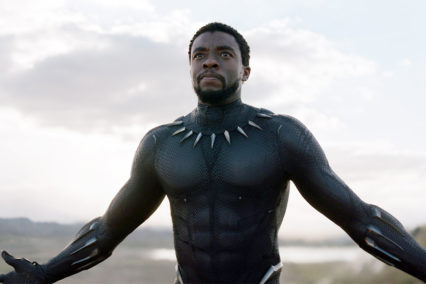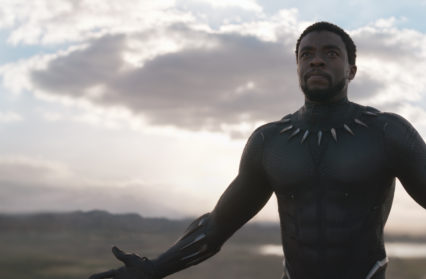Phil Morris shines a light on the movie Black Panther starring Chadwick Boseman and analyses its impact on the movie industry.

A meme doing the rounds on social media networks exalts in the appearance of a Welsh flag at an address to the UN from King T’Challa of Wakanda, a fictional African nation. The urgent question is raised – has Wales secured its independence in the Marvel cinematic universe? Yes, the state of our politics is clearly so parlous that we look to fantasies made for children to find signs of progress. With reports of opening weekend receipts in the US topping $192 million, contributing to a worldwide gross of $361 million, it’s tempting to accept the judgement of many movie critics who herald Black Panther as evidence that pop culture is becoming increasingly woke, and waking up the wider world to debates surrounding racial, gender and sexual identities.
While I’m happy to report that Black Panther is a hugely entertaining movie, well-acted, driven by compelling characters and textured by a rich palette of African-inspired designs and cultural motifs, it steadfastly remains a movie for children and those in suspended adolescence. This isn’t quite the damning criticism it seems, for who can overstate the power, for both black and white youths, of hero-worshipping a man who signifies blackness by the colour of his skin, and whose moral reference points are generations of African tradition? We’ve seen Wesley Snipes as vampire-killer Blade, Samuel L. Jackson as Avengers boss Nick Fury, and both Terence Howard and Don Cheadle have suited-up as substitute Iron Men, but in Black Panther, we find a black hero consumed with the destiny of his African kingdom and its relationship to black peoples across the globe.
The aforementioned Wakanda is a technologically-advanced and gender-enlightened society built on a mountain of Vibranium, a mystical element that powers both its hidden capital city and the heart-shaped herb that conveys super-strength upon its King, the eponymous Black Panther. Such is Vibranium’s awesome potential as a destructive force, the Wakandans have masked their vast wealth and pioneering science from the outside world for centuries. Upon assuming the throne, T’Challa is faced not only with the exterior threat of Afrikaaner master-criminal Ulysses Klaue – played by Andy Serkis with an eye-popping glee reminiscent of his earlier triumph as Golum – but also the pressing question of whether the stupendous resources of Wakanda should be offered in support of economically and socially disadvantaged peoples inside Africa and beyond. This is a serious and important question, but given the exigencies of the commercial blockbuster, it’s one that is explored superficially at the level of soundbites exchanged in a Manichean struggle between goodies and baddies.
Oh shut up, my inner fanboy squeals, what were you expecting – a Fanonesque disquisition on the complexities of post-colonial identity? – eat your popcorn and just be grateful the movie also features four examples of empowered women who demonstrate, at various stages, moral, scientific and military leadership. Black Panther certainly operates on several levels above the hypocritical having-its-cake-and-eating-it celebration of international arms-dealing and playboy sexual politics that is the execrable Iron Man series. The attitude of those movies towards women is exemplified by Pepper Potts’ crack about “taking out the trash” i.e. her discreet disposal of Tony Stark’s conquests. In Coogler’s movie, the always impressive Lupita Nyong’o brings a steely earnestness to the role of Nakia, beginning the film as a spy working to liberate Nigerian women from the clutches of people-traffickers, and ending it as the future Queen of Wakanda and the inspiration behind T’Challa’s new foreign policy of engagement with other African countries and the international black diaspora. Scenes depicting women taking the fight to men, physically and intellectually, constitute a welcome advance on the soft-pedalled feminism of Warner Bros’ Wonder Woman, and yet the conflict in Black Panther ultimately boils down to a gravity-defying fist-fight between two men motivated by the competing legacies of their fathers.
Nemesis for T’Challa, imbued with quiet charisma by Chadwick Boseman, comes in the form of former CIA assassin Erik ‘Killmonger’ Stevens (Michael B. Jordan), who turns out to be the son of renegade Wakandan Prince N’Jobu. Inspired by his dead father’s vision of militarised, pan-global black militancy, Killmonger usurps his cousin’s throne with the aim of arming revolutionary movements with weaponised Wakandan tech. In an earlier scene, the snooty curator of a British museum tries to educate Killmonger on the provenance of an African artefact, when he quickly corrects her misattribution, evidencing a better understanding of his own heritage, before poisoning her and taking back the stolen treasure. It is a moment of delicious post-colonial revenge, served ice cold, but such sharp satirical edges are frustrating, though perhaps inevitably, blunted by an insistence that the racial and economic inequalities of the world be corrected by a mythic super-science financed with the beneficence of a fictional kingdom. This dulling of the movie’s critique of global inequality is underlined by the implausible casting of Martin Freeman as a CIA operative who joins with T’Challa and his allies. Positioning a member of the CIA as one of the good guys in the struggle for black consciousness rather puzzlingly white-washes the agency’s historical role in oppressing minorities, and can only be explained as a sop to ensure that a mainstream, i.e. white audience, swells the movie’s box-office take.
Following Creed (2015), the inspired reinvention of the once-moribund Rocky franchise, Black Panther provides further proof that Coogler is a story-teller of formidable skill and talent. He never loses sight of the narrative of each character, even as the sturm-und-drang of superhero spectacle rages. In this effort, he’s aided by an impressive, almost entirely black cast, which includes; BAFTA-award-winning rising star Daniel Kaluuya, an imperious Angela Bassett and the legendary playwright and anti-Apartheid activist John Kani. The production design by Hannah Beachler draws inspiration from the architecture of sub-Saharan countries, notable buildings by the late Zaha Hadid, providing tantalising glimpses of African-inflected modernity. This optimistic vision of Wakanda is, like the movie itself, a welcome antidote to the bleak and hopeless images of Africa familiar to us from TV news reports. But I’m afraid we’ll have to wait for films of greater seriousness to properly explain the historical and structural forces that produce poverty and civil war in such an abundantly fertile and natural resource-rich continent. For many, the dream of Wakanda will suffice for now.
Black Panther, starring Chadwick Boseman, is available to stream through online platforms.
Wales Arts Review has a number of pieces on contemporary tv and film available to read.












